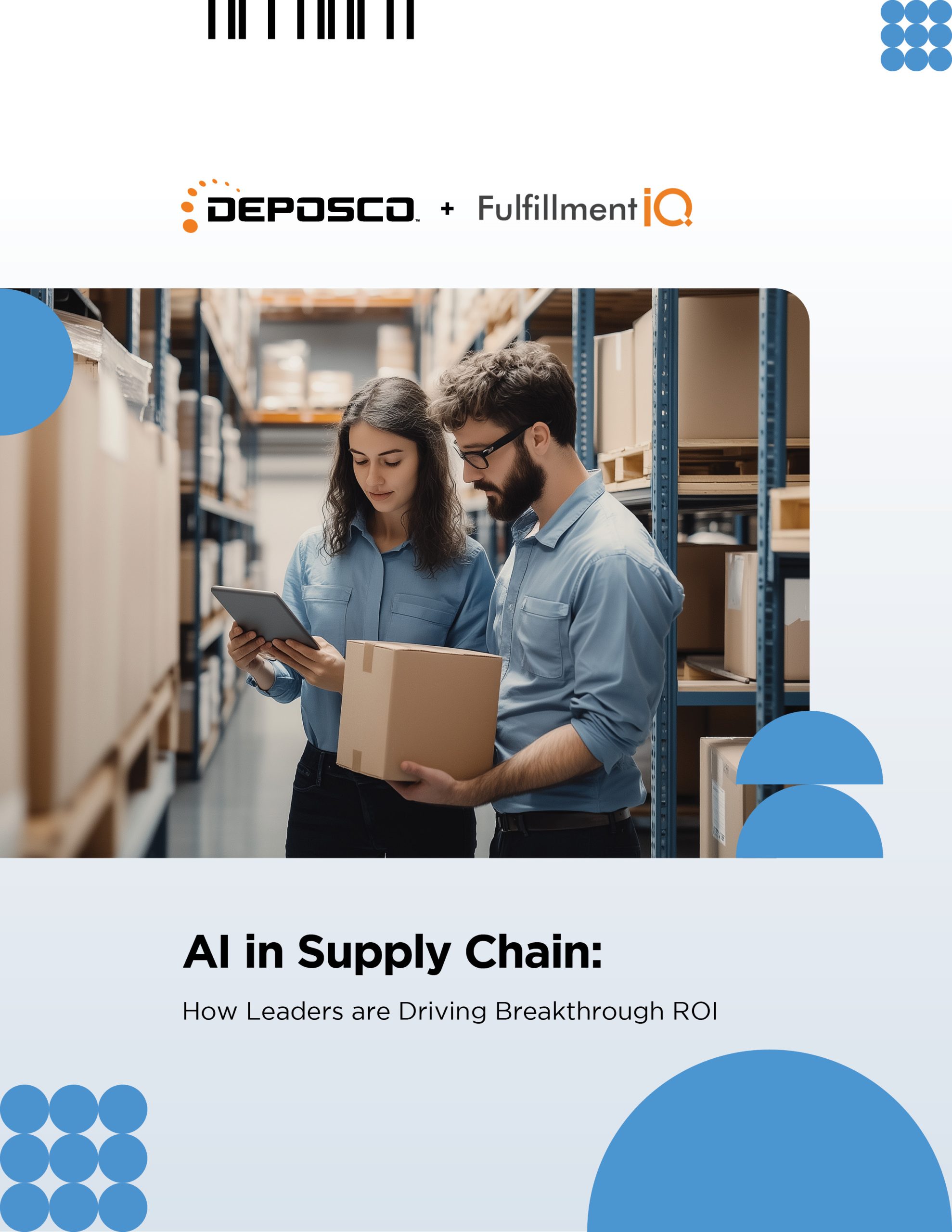The right architectural foundation transforms AI from promising technology into proven results.
AI is revolutionizing supply chains—but not equally. While 47% of organizations struggle to measure their AI investments’ true value according to our 2025 AI report, others are achieving breakthrough results: 30% inventory reductions, 95% demand forecasting accuracy, and 15% logistics cost savings that actually materialize.
What separates success stories from struggles? It’s not the AI algorithms themselves. The difference lies in the architectural foundation supporting those algorithms.
Companies achieving transformational AI results share a common advantage: they’ve built their operations on supply chain platforms designed to unleash AI’s full potential. Here’s how to identify and implement AI-enabled supply chain solutions that deliver on their promises.
The Foundation: Why Unified Data Access Powers AI Success
AI’s effectiveness depends entirely on unified, real-time data access. Your algorithms and AI models are only as accurate as the data they can reach—and when that data flows seamlessly across your entire operation, AI transforms from theoretical promise to competitive advantage.
The most successful AI supply chain implementations in 2026 share one critical characteristic: they operate on platforms architected specifically to give complete visibility. These systems eliminate data silos, ensure real-time synchronization, and provide AI algorithms with the comprehensive information they need to deliver accurate predictions and intelligent recommendations.
The Data Unity Advantage
When AI can access complete, real-time data across your supply chain—inventory levels, order history, shipping performance, demand signals, marketplace trends—it can make better decisions. Research shows that companies with unified data architectures achieve 40% better forecast accuracy compared to those managing fragmented systems. The data provides context for the models to determine the best outcome for that specific scenario.
Modern platforms built with AI in mind create this data unity from the ground up. Rather than forcing AI to navigate disconnected systems with different update cycles, they provide a single source of truth that AI can leverage instantly.
Three Success Factors for AI-Ready Supply Chain Platforms
1. Purpose-Built Architecture Accelerates Results
Successful AI supply chain implementations run on unified systems from Day One. These platforms share several advantages:
Comprehensive Data Flow: Every module accesses the same real-time data, ensuring AI makes predictions on complete information rather than fragmented snapshots.
Rapid Adaptation: When business needs evolve—new carriers, fulfillment strategies, or inventory approaches—AI models can adapt quickly because the underlying architecture supports agile changes.
Reliable Performance: Without architectural fragmentation, AI algorithms receive clean, consistent data that has known connections with the rest of the data, allowing the AI models to understand when this happens, and this outcome is the most likely one. This improves prediction accuracy and builds team trust in AI recommendations.
Grab our 2025 AI report with Fulfillment IQ to discover how early adopters are seeing remarkable returns and competitive advantages: lower transportation and logistics costs; better delivery reliability; optimal stock availability, usage, and sales capture; and faster decision-making.

Companies implementing these purpose-built platforms report significantly faster time-to-value than those managing multiple acquired systems held together by integration layers.
2. Comprehensive Integration Ecosystem Expands AI Capabilities
Leading AI supply chain platforms come with extensive pre-built integrations maintained by the vendor. This integration ecosystem immediately expands what your AI can accomplish:
Complete Market Visibility: Pre-built marketplace integrations give demand forecasting AI access to real-time trends across all your sales channels from day one.
Optimized Operations: Maintained carrier, WMS, and TMS integrations, enabling route optimization AI to leverage real-time performance data for more intelligent decisions.
Accelerated Implementation: When platforms include integrations for ERPs, CRMs, marketplaces, and carrier systems, your AI starts learning from complete data immediately. AI works best with more context, so the sooner you can start capturing your complete dataset, the faster and more accurately it can be used to enable better decision-making and action.
Future-Proof Foundation: Vendors that maintain these integrations handle API updates and version changes, ensuring your AI’s data access stays reliable as your technology ecosystem evolves. They also manage the backend tokenization required to interact with AI models.
This approach transforms integration from an ongoing expense into an immediate capability, letting your team focus on optimizing operations rather than maintaining connections.
3. Rapid Implementation Delivers Fast ROI
Industry-best AI supply chain platforms, such as Deposco, go live in 90 days and deliver measurable value within 6 months. What does this speed mean to you?
Quick Wins Build Momentum: Fast implementations mean your AI starts learning from real data and delivering improvements within months, building organizational confidence in the technology.
Lower Risk: Shorter timelines reduce project risk and allow faster course corrections based on real-world performance.
Competitive Advantage: While competitors spend quarters implementing complex systems, you’re already optimizing inventory, improving forecast accuracy, and reducing logistics costs.
Modern platforms achieve this speed through cloud-native architecture, streamlined configuration processes, and implementation methodologies refined across hundreds of deployments.
Turning AI Promises Into Business Results
AI supply chain platforms delivering breakthrough results in 2026 share common characteristics that make success predictable rather than hopeful:
Unified Architecture: Single codebase platforms where AI can access complete operational data without navigating integration complexity or dealing with synchronization delays.
Extensive Integration Ecosystem: Pre-built, maintained connections to the systems you already use, ensuring AI has comprehensive data from day one and ongoing vendor responsibility for keeping those connections current.
Proven Implementation Speed: Track records showing 90-day go-lives and six-month ROI, demonstrating both architectural simplicity and vendor expertise.
AI-First Design: Platforms architected specifically to support AI and machine learning, with data models, APIs, and processing capabilities designed for algorithmic intelligence rather than retrofitted onto legacy systems.
Making the Right Decision
AI can transform supply chain operations, delivering improvements that directly impact your bottom line. Companies achieving breakthrough results aren’t relying on superior algorithms—they’ve chosen platforms architected to unlock AI’s full potential from day one.
When evaluating platforms, ask questions that reveal architectural strength:
Architecture: “Is this a unified codebase or integrated products from acquisitions?”
Integrations: “Show me your pre-built integrations for our ERP, marketplaces, and carriers. Who maintains these?”
Track Record: “What were the actual timelines for your five most recent implementations? When did customers see ROI?”
Data Access: “Are there delays between when events happen and when AI can factor them into decisions?”
The answers reveal whether you’re investing in a platform that will accelerate success or create ongoing challenges. The AI-powered supply chains winning today run on foundations that turn algorithmic promise into operational reality—implementing quickly, delivering measurable improvements within months, and empowering teams to focus on strategic decisions rather than technical troubleshooting.
The future of supply chain operations is intelligent, automated, and remarkably efficient. With the proper platform foundation, that future is accessible today.
Ready to see what AI can accomplish with the right architectural foundation?
Discover how modern supply chain platforms are delivering AI results that actually match the promises. BOOK A DEMO
